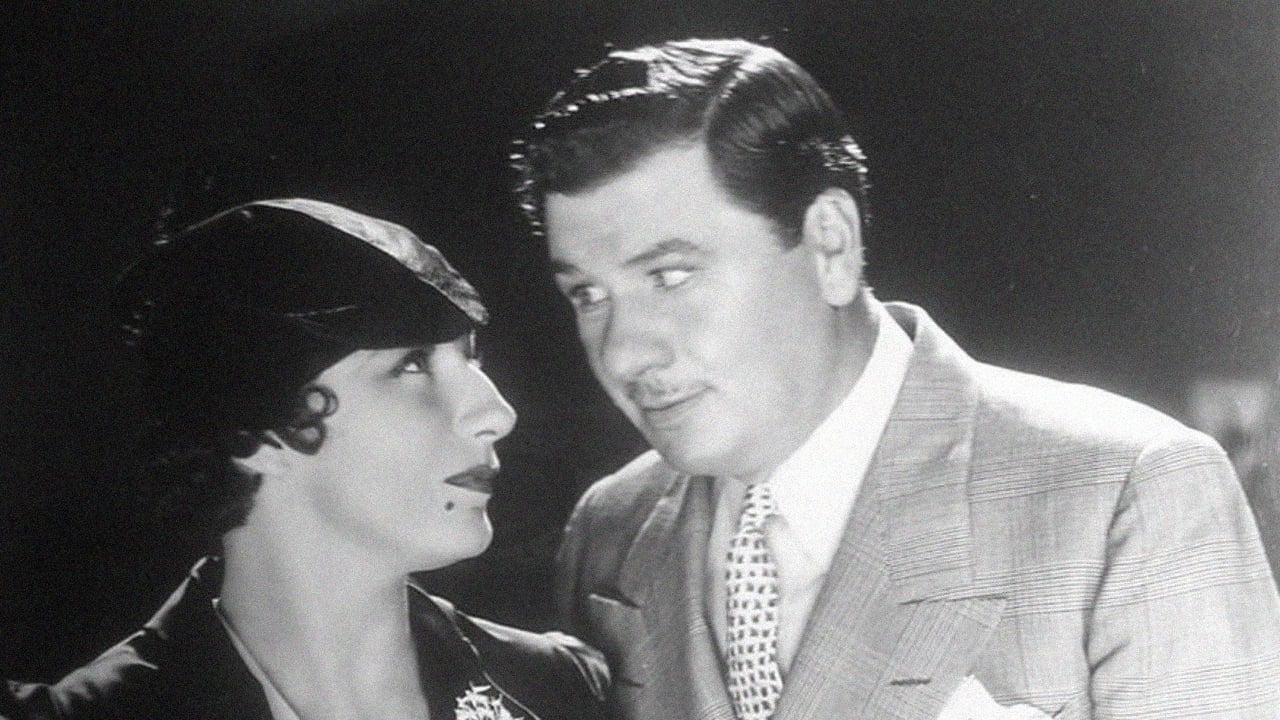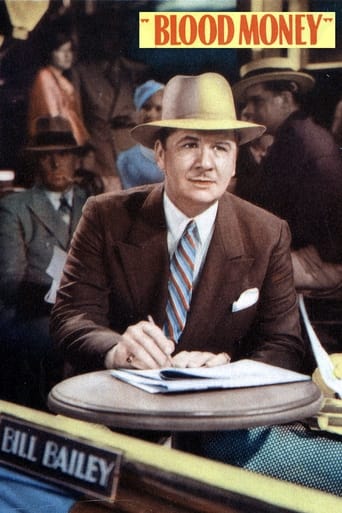Bardlerx
Strictly average movie
SparkMore
n my opinion it was a great movie with some interesting elements, even though having some plot holes and the ending probably was just too messy and crammed together, but still fun to watch and not your casual movie that is similar to all other ones.
Doomtomylo
a film so unique, intoxicating and bizarre that it not only demands another viewing, but is also forgivable as a satirical comedy where the jokes eventually take the back seat.
Richard Chatten
Wow! Were do you start with this one?Director Rowland Brown (soon blackballed in Hollywood for hitting a producer) certainly confirms his reputation for style with this racy little pre-Code gem, in which an impossibly youthful Judith Anderson and Frances Dee are both revelations: the former as a supple, sleepy-eyed, smoky-voiced dame draped in a succession of slinky backless thirties evening gowns; the latter as a spoilt little minx who in Miss Dee's own words is a "a kleptomaniac, a nymphomaniac, and anything in between".Great fun.
calvinnme
...who spent so much time over at RKO playing the sweet young thing. Dee plays the catalyst of the entire story, even though, sometimes, you won't even know what she is up to.The main character, however, is George Bancroft as Bill Bailey, a bail bondsman and PR man extraordinaire. It shows how well connected he is as just about every criminal in town has bail through Bailey. He knows the attorneys, the judges, and most of the underworld. He carries around cigars that say "Bailey For Bail" on them. It's mentioned later that he was once a cop that got thrown off the force for graft, and even though he's a gray character, he plays this like Popeye - "I am what I am", and you know something, I liked him. I liked him because he was on the level about who he was and what he did. He has a girlfriend (Judith Anderson as Ruby Darling) who seems to be a madam, maybe not, but for sure runs an upscale saloon complete with torch singers. And she, like Bailey, "is what she is". She does not pretend.And then a different kind of customer walks into his establishment - socialite Elaine Talbart (Frances Dee), arrested for shoplifting, and hands him a six thousand dollar ring as collateral for much smaller bail. She claims the whole thing is a big misunderstanding (it is not). At first Bailey is just intrigued because her family is so wealthy, but soon he is falling for the girl. However, Elaine's big downfall, and the downfall of everybody she encounters, is that she is a spoiled brat who is addicted to excitement and danger. And THAT is why she starts a relationship with Bailey. He shows her a side of life she has never seen before.One more thing, towards the beginning of the film Ruby's baby brother gets out of prison. Nope. There was no mistake. Her little brother Drury is a thief and probably will always be one. He doesn't like violence, he just likes money and isn't partial to hard work.And then one day at the races when Bailey is with Elaine, over walks good looking Drury, and when she finds out his past she gets a twinkle in her eye...a ticket to even more excitement! Boy, has she got that right because Drury is about to pull another bank job. When he skips town with Bailey's bail and with his girl, it starts warfare with Ruby and the underworld on one side and Bailey, who realigns himself with the police, on the other side. The thing that nobody knows is that the act of betrayal that starts it all is caused by a decision Elaine makes unilaterally. How does this all work out and what was that decision? Watch and find out. I'll just say that the end of this film was a blast.There are some great individual scenes in this one that are strictly precode - at Ruby's, Bailey offers a gentleman a cigar, "he" turns around and turns out to be a woman in a man's suit. She takes a puff of the cigar and says "you big sissy!". Bailey busts out laughing. A woman comes into Bailey's office with a boy about 15 and wants to put up his bail. She says "her boy is a good boy". Bailey asks what the charge is and she says "assault" - that was code for rape in even the precode era. Bailey asks how old the girl was, and the boy says 38. Bailey laughs at the thought - a thought that would not be funny today. Finally, a woman runs screaming out of a building claiming that a man advertised for artists' models, she showed up, and he attacked her. Elaine asks where is the artist? The woman points to an office, and Elaine grabs the ad and walks deliberately towards the office. Hot stuff from Fox, a studio not usually associated with precode stuff.
marcslope
One of the most interesting of the Fox pre-code talkies, for several reasons: 1) It has nice girl Frances Dee as a perverse and masochistic society miss, snarling and hip-shaking and shocking the elite. 2) It has Judith Anderson, in a swell backless evening gown, playing a moll, against-the-grain casting of the most inspired sort, even if the movie never explains her high-tone Brit accent vs. her brother's American Midwest elongated vowels. (She also played a gangster years later in "Lady Scarface," but it's a much less interesting film.) 3) You get to see Blossom Seeley, the great vaudevillian, sob a couple of torch songs, and she's the real thing. 4), and most fascinatingly: George Bancroft plays a no- better-than-he-should-be bail bondsman who works both sides of the street and is terribly corrupt, yet the movie likes him, we like him, and he doesn't have to repent for it. It's lively and violent and funny, and, unlike so many Fox early talkies, it has the fast pace of a good Paramount or Warners flick from the same period.
F Gwynplaine MacIntyre
Bail bondsman Bill Bailey's motto is "Bailey for Bail", and he always has a fistful of cash for any felon who needs bail money. Bailey has plenty of friends in the crime world, and plenty of enemies among the city's district attorneys. But most of Bailey's "friends" are strictly the fair-weather type; his only true friend is Ruby Darling, who sees plenty but reveals very little. Bailey and Ruby spend a lot of time going to nightclubs where the women smoke cigars and dress like men.Bailey has got a hot passion for Elaine Talbert (who does NOT dress like a man), but Elaine prefers guys who treat her rough and make her like it. Elaine persuades her boyfriend to steal some financial securities, confident that (if he gets caught) good old Bailey will bail him out.Meanwhile, some of Bailey's gangster pals have decided he's been breathing too long. They invite Bailey to join them at the pool hall for a friendly game of eight-ball. Oh, yeah: everybody but Bailey knows that the eight-ball is full of nitroglycerin ... if Bailey pots the black, he goes boom. Desperately, Ruby races to the pool hall to warn her friend. Will she get there in time to stop Bill Bailey's billiard-ball bomb, or will Bailey end up behind the eight-ball?"Blood Money" is a weird film, strangely fascinating. It was written and directed by Rowland Brown, a brilliant film-maker whose promising career was ruined by his penchant for violence. After punching out several Hollywood producers who got in his way, Brown decided to relocate to England for a fresh start. His credentials and his substantial talent won him the assignment to direct Leslie Howard in "The Scarlet Pimpernel" ... but, once again, a minor disagreement with a producer led to violence, and Brown was blackballed.SPOILERS COMING. "Blood Money" features some strange depictions of 1930s sexuality. There's a mannish woman in the nightclub; she offers Bailey a cigar and calls him a "big cissy". Elsewhere, Bailey bullies a cabdriver and calls him a "fag". (The cabbie is played by beefy Matt McHugh, an actor not usually cast in "swish" roles.) Bailey's love interest Elaine is clearly a sexual masochist, who goads men into beating her. Frances Dee, who usually played virginal good-girl roles, gives the best performance of her career here. At the end of the film, Elaine meets a young woman - weeping, her clothes torn - who has just been beaten and violated by her prospective employer. Elaine asks for the man's address, implying that she'll take action against him ... but, when we see the look of eager delight on her face, we know why she's really going there.Watch for a brief appearance (in the nightclub sequence) by vaudeville star Blossom Seeley, singing a Rodgers and Hart ballad called "The Bad in Every Man". If this obscure song sounds familiar, that's because Richard Rodgers later used the same tune (with a new lyric by Lorenz Hart) as the much better-known song "Blue Moon"."Blood Money"'s climactic scene with the explosive eight-ball is ridiculous, especially since Buster Keaton had already played this same idea for comedy (with an explosive 13-ball) in "Sherlock Junior". But Judith Anderson (later a Dame of the British Empire) plays her role well, despite some corny dialogue, and the eight-ball is defused in an unexpected way. My rating for 'Blood Money': 9 out of 10.

